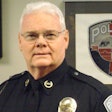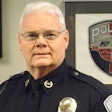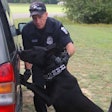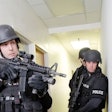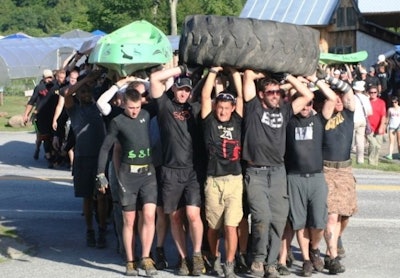 Photo courtesy of Spartan Death Race.
Photo courtesy of Spartan Death Race.
Earlier this year, we covered the story of Joshua Purkiss, a remarkable Chicago Police officer who put himself to the ultimate endurance test—the Spartan Death Race.
For the uninitiated, the Spartan Death Race is arguably the greatest test of a person's body, mind, and spirit—a nearly four-day race on a 50-mile obstacle course in the dense Vermont woods that's completed by less than 20% of its participants.
Officer Purkiss—we told his story in "One Cop's Spartan Challange"—participated in the race to bring attention to crippling federal funding cuts to counter-drug training centers such as the Midwest Counterdrug Training Center (M.C.T.C.). Purkiss attended the center, and it made him a better cop and narcotics investigator.
Beginning in late 2011, Purkiss adopted a grueling training regimen to prepare for the annual race, which began on Friday (June 15) in Pittsfield, Vt. It ended almost four days (67 hours) later.
Here are a few of the challenges competitors faced this year:
- A 25-mile, 12-hour hike (done as a team challenge) carrying either a kayak, water filled plumbing pipes, or a tractor tire above their heads
- A 250-question exam with brain twisters
- Swimming in the Chittenden dam
- Farm work including stacking hay bales
- 1,000 Burpees
- A log chop
- A 2-mile body roll through a sheep paddock
- Carrying a 50-pound bag of cement to the top of a mountain on a three-hour trek up and through a steep ravine and waterfall.
The race's theme this year was "betrayal," which played out as organizers mislead racers and planted competitors who cheated on the challenges. The course map and list of challenges were kept secret. The race was more than 15 hours longer than last year, causing race leaders who endured more than 50 hours to quit soon before the race was called.
This year's race held true to form. Of the 344 registered participants, only 51 completed the race. Another eight were designated as unofficial finishers because they missed or didn't complete some of the challenges.
Joshua Purkiss was not among the finishers. The officer suffered an injury about 5 1/2 hours after the 8:30 a.m. start of the race, according to Doug Drotman, a race spokesman.
While he didn't reach his goal, Purkiss deserves credit for putting a spotlight on federal funding for local law enforcement training. As POLICE Magazine publisher Leslie Pfeiffer wrote in an April editorial, we're in the midst of a police training crisis, because training is the first to go during a budget crisis.
We're just glad there are officers such as Joshua Purkiss willing to bring attention to this critical issue.
Related:
















